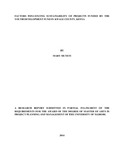| dc.description.abstract | Youth unemployment is a global phenomenon and many countries across the globe have
responded to this phenomenon in different ways. In the Kenyan context, creation of YEF through
an act of parliament in 2007 to make affordable credit available to youths who had chosen to be
entrepreneurs is one of such interventions. As nations across the globe try to address this
phenomenon, it is very important to ensure that any intervention or strategy employed to deal
with this menace must remain sustainable. In that regard, this study was conceptualized to
determine factors influencing sustainability of projects funded by youth development fund in
Kwale County. The study involved 143 registered youth groups in Matuga constituency of which
60 youth groups were selected through systematic random sampling to participate in the study.
The study revealed that on average, 84% of the groups were not practicing prudent financial
management and majority of their leaders (75%) did not consider prudent financial management
as an important factor in sustainability of their groups. 60% of respondents interviewed stated
that their groups had weak management and leadership system and another 92% stated that
agencies funding their activities do not provide them with continuous leadership training.
Interestingly, 90% of respondents reported that effective leadership was very essential for
survival of their groups. With regard to active participation of members in the affairs of their
groups, over 87% of respondents reported that their members were very actively involved in
their group activities and 90% of respondents interviewed unanimously agreed that active
participation of members in group activities contribute significantly to success and sustainability
of a group. Finally, 90% of respondents reported that their projects were not adequately financed
with majority (92%) suggesting that group projects would always remain sustainable when they
were adequately financed | en_US |

